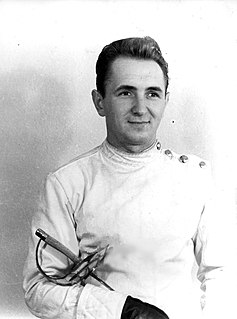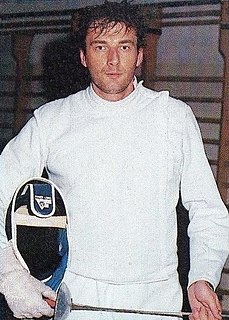
The men's sabre was one of eight fencing events on the fencing at the 1964 Summer Olympics programme. It was the fifteenth appearance of the event. The competition was held from October 19 to 20, 1964. 52 fencers from 21 nations competed. Nations had been limited to three fencers each since 1928. The event was won by Tibor Pézsa, the final of nine straight Games in which a Hungarian fencer won the event. The silver medal went to Claude Arabo of France, with Umyar Mavlikhanov of the Soviet Union taking bronze.
The men's team sabre was one of seven fencing events on the Fencing at the 1928 Summer Olympics programme. It was the fifth appearance of the event. The competition was held from 8 August 1928 to 9 August 1928. 65 fencers from 12 nations competed.
The men's team épée was one of seven fencing events on the fencing at the 1936 Summer Olympics programme. It was the seventh appearance of the event. The competition was held from 7 August 1936 to 8 August 1936. 108 fencers from 21 nations competed. Each team could have a maximum of six fencers, with four participating in any given match.
The men's team sabre was one of seven fencing events on the fencing at the 1936 Summer Olympics programme. It was the seventh appearance of the event. The competition was held from 12 August 1936 to 13 August 1936. 107 fencers from 21 nations competed. Each team could have a maximum of six fencers, with four participating in any given match.
The men's team épée was one of seven fencing events on the fencing at the 1948 Summer Olympics programme. It was the eighth appearance of the event. The competition was held from 5 August 1948 to 6 August 1948. 113 fencers from 21 nations competed.

The men's sabre was one of seven fencing events on the fencing at the 1948 Summer Olympics programme. It was the eleventh appearance of the event. The competition was held from 12 August 1948 to 13 August 1948. 60 fencers from 24 nations competed. Nations were limited to three fencers each. The event was won by Aladár Gerevich, the fifth of nine straight Games in which a Hungarian would win the event. Gerevich became the third man to win multiple medals in the individual sabre, adding to his 1936 bronze. Vincenzo Pinton of Italy took silver and Pál Kovács of Hungary took bronze; it was the third straight Games where the sabre podium was Hungary-Italy-Hungary.
The men's team sabre was one of seven fencing events on the fencing at the 1948 Summer Olympics programme. It was the eighth appearance of the event. The competition was held from 10 August 1948 to 11 August 1948. 85 fencers from 17 nations competed.

The men's sabre was one of seven fencing events on the fencing at the 1952 Summer Olympics programme. It was the twelfth appearance of the event. The competition was held from 31 July 1952 to 1 August 1952. 66 fencers from 26 nations competed. Nations were limited to three fencers each. The event was won by Pál Kovács, the sixth of nine straight Games in which a Hungarian would win the event. Kovács became the fourth man to win multiple medals in the individual sabre, adding to his 1948 bronze. Hungary swept the medals in the event for the second time. Aladár Gerevich's silver completed a set of three different color medals in the event, the first man to win three medals in individual sabre. Tibor Berczelly earned bronze.
The men's team sabre was one of seven fencing events on the fencing at the 1952 Summer Olympics programme. It was the ninth appearance of the event. The competition was held from 29 July 1952, to 30 July 1952. 85 fencers from 19 nations competed.
The men's team foil was one of seven fencing events on the fencing at the 1956 Summer Olympics programme. It was the ninth appearance of the event. The competition was held 23 November 1956. 50 fencers from 9 nations competed.
The men's team épée was one of seven fencing events on the fencing at the 1956 Summer Olympics programme. It was the tenth appearance of the event. The competition was held on 28 November 1956. 55 fencers from 11 nations competed.

The men's sabre was one of seven fencing events on the fencing at the 1956 Summer Olympics programme. It was the thirteenth appearance of the event. The competition was held on 5 December 1956. 35 fencers from 17 nations competed. Nations had been limited to three fencers each since 1928. The event was won by Rudolf Kárpáti, the seventh of nine straight Games in which a Hungarian would win the event. Jerzy Pawłowski of Poland took silver and Lev Kuznetsov of the Soviet Union took bronze, the first medals in the event for each nation and the first time since 1924 that any nation other than Hungary and Italy earned a medal in the men's sabre.
The men's team foil was one of eight fencing events on the fencing at the 1960 Summer Olympics programme. It was the tenth appearance of the event. The competition was held on 2 September 1960. 77 fencers from 16 nations competed.

The men's team épée was one of eight fencing events on the fencing at the 1960 Summer Olympics programme. It was the eleventh appearance of the event. The competition was held on 9 September 1960. 105 fencers from 21 nations competed.

The men's sabre was one of eight fencing events on the fencing at the 1960 Summer Olympics programme. It was the fourteenth appearance of the event. The competition was held from 7 to 8 September 1960. 70 fencers from 29 nations competed. Nations had been limited to three fencers each since 1928. The event was won by Rudolf Kárpáti, the eighth of nine straight Games in which a Hungarian would win the event. Kárpáti was the second man to successfully defend an Olympic title in the men's sabre and fifth to win multiple medals of any color. His teammate Zoltán Horváth took silver while Wladimiro Calarese of Italy finished with the bronze.

The women's team foil was one of eight fencing events on the fencing at the 1960 Summer Olympics programme. It was the first appearance of the event. The competition was held on 3 September 1960. 57 fencers from 12 nations competed. The winner of the tournament was the Soviet Union, followed by Hungary and Italy in third.

The men's sabre was one of eight fencing events on the fencing at the 1968 Summer Olympics programme. It was the sixteenth appearance of the event. The competition was held from 16 to 17 October 1968. 40 fencers from 16 nations competed. Nations had been limited to three fencers each since 1928. The event was won by Jerzy Pawłowski of Poland, breaking a nine-Games string of Hungarian victories in the event. Hungary's best result in the event was Tibor Pézsa's bronze; Pézsa beat Pawłowski in the final pool but the Hungarian lost two other bouts while the Pole was otherwise flawless. Mark Rakita of the Soviet Union lost only to Pawłowski in the final pool, forcing another bout to break the tie between them for gold and silver; that barrage bout was decided by a single point as Pawłowski beat Rakita 5–4.

The men's sabre was one of eight fencing events on the fencing at the 1976 Summer Olympics programme. It was the eighteenth appearance of the event. The competition was held from July 21 to 22, 1976. 46 fencers from 18 nations competed. Nations had been limited to three fencers each since 1928. The event was won by Viktor Krovopuskov of the Soviet Union, the nation's second consecutive victory in the men's sabre. The Soviet Union's two gold medals in the event moved it out of a six-way tie into sole possession of second place all-time, after Hungary with 11. The Soviet team swept the men's sabre medals in 1976, with Vladimir Nazlymov taking silver and Viktor Sidyak bronze. It was the third sweep in the event. Nazlymov and Sidyak were the eighth and ninth men to win multiple medals in the event. Excluding matches against each other, the three Soviets went 48–3 during the tournament. For the first time since 1900, Hungary competed in the men's sabre but did not win a medal.
The men's team sabre was one of eight fencing events on the fencing at the 1980 Summer Olympics programme. It was the sixteenth appearance of the event. The competition was held from 28 to 29 July 1980. 63 fencers from 8 nations competed.

The men's sabre was one of eight fencing events on the fencing at the 1988 Summer Olympics programme. It was the twenty-first appearance of the event. The competition was held from 22 to 23 September 1988. 40 fencers from 18 nations competed. Nations had been limited to three fencers each since 1928. The event was won by defending champion Jean-François Lamour of France, the fourth man to successfully defend an Olympic title in the sabre and the 11th man overall to win multiple medals in the event. It was France's third victory in the event, matching the Soviet Union for second-most all-time. Janusz Olech took silver, Poland's first medal in the event since 1968. Italian Giovanni Scalzo earned bronze.










